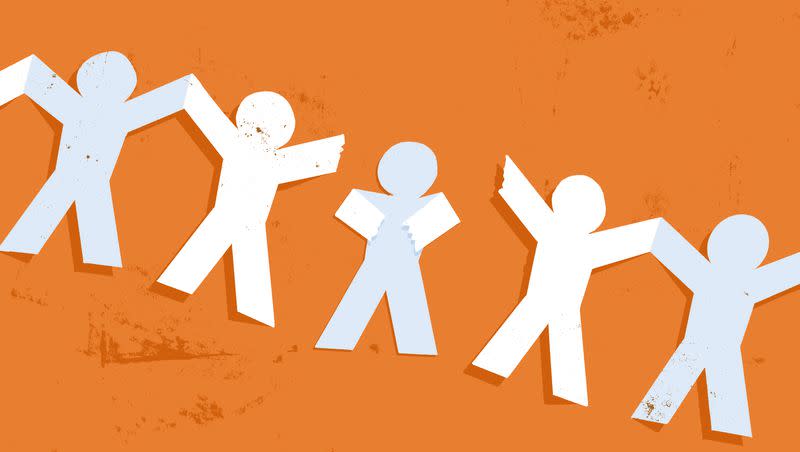Perspective: How ‘gentle parenting’ fosters fragility

- Oops!Something went wrong.Please try again later.
Today’s trend in child-rearing, gentle parenting, centers on collaboratively managing children’s feelings rather than authoritatively correcting their misbehavior.
As Jessica Winter wrote last year for The New Yorker, “In its broadest outlines, gentle parenting centers on acknowledging a child’s feelings and the motivations behind challenging behavior, as opposed to correcting the behavior itself.”
In other words, she explained, “Instead of issuing commands (‘Put on your shoes!’), the parent strives to understand why a child is acting out in the first place (‘What’s up, honey? You don’t want to put your shoes on?’ or, perhaps, narrates the problem (‘You’re playing with your trains because putting on shoes doesn’t feel good’).”
While there are some positive aspects to this approach, it is by and large a failure, even on its own terms.
Gentle parenting promises to foster self-awareness, resilience and independence in children. Yet, the gentler parenting gets, the more solipsistic, fragile and needy our children become. The approach militates against its stated aims — as most people who ever raised children could have intuited it would.
It is true that gentle parenting’s emphasis on age-appropriate understanding and consistent boundaries is a common-sense correction to the kind of capricious parental reactivity to which too many children have been subjected. That said, excising commands like “stop it,” reasons like “because I said so,” and punishments like “time out” from the parental toolkit is prohibitively time-consuming for all but the smallest, most privileged and least temperamental families (not to mention pointlessly stressful for all families).
More important and far-reaching than these pragmatic considerations, though, is the more interesting question of why otherwise intelligent and indisputably loving parents would double down on an approach that makes parenting so much harder and kids so much more annoying.
The unlikely answer?
Eighteenth century French philosopher Jean-Jacques Rousseau, whose ideas about child development have undergirded mainstream educational thought since the 1960s and are presently finding their way into parental thought under the banner of gentle parenting.
Related
Perspective: ‘I haven’t slept through the night in 5 years’ — the costs of gentle parenting
Fulfilling but hard: What American parents say about parenting
As former Nebraska senator and current University of Florida President Ben Sasse points out in his 2017 book, “The Vanishing American Adult,” Rousseau’s “Emile” from 1762 is perhaps the most holistic and influential articulation of the notion that people are naturally good and it is society that corrupts.
Per Rousseau: “Everything is good as it leaves the hands of the Author of things; everything degenerates in the hands of man.” In other words: Human nature, untouched by other humans, is benevolent; it is the societal process of creating a “citizen” rather than simply a “man” that leads people into characterological error.
The obvious illogic of Rousseau’s contention notwithstanding (how, exactly, does a society created by innately virtuous humans become the source of those humans’ own corruption?), his seductive conception of children’s fundamental goodness has long proven influential in progressive educational circles.
Only recently, however, have parents as well as educators begun to prove susceptible to the false notion of children as angelic creatures who require self-understanding above all.
As late as when I was growing up in the 1990s, the unspoken assumption of parenting was that children need to be proactively formed through the exercise of parental authority.
Thirty years ago, even as America was becoming more secular, parents still mostly accepted without question the idea that bad behavior originates from within. It was widely assumed, in other words, that human nature is at least as prone to cruelty, chaos and selfishness as it is to empathy, order and sacrifice.
From this perspective, the goal of parenting is to help children learn to behave in accordance with virtue, rather than with feeling. By the 1990s, such a project was understood to involve sympathizing with a child’s emotions as part of helping her to conquer those feelings in deference to reason and self-discipline.
But almost no one assumed that feelings should be “the core of who we are” past the age of two, nor did anyone think that collaborative child-rearing and the forfeiture of parental (and, eventually, institutional and societal) authority was the way to raise confident, well-adjusted kids.
Because it isn’t. It’s the way to raise fragile, needy pseudo-adults.
Consider the crisis of mental health and anxiety among today’s preteens, teens and young adults. Is it any coincidence that kids who were never expected to cope easily with being told “no” as a matter of course, and who were instead constantly prepared for and talked through every minor disappointment, later find it difficult to manage the rejections and limitations of a world that doesn’t care about their feelings?
Is it any surprise that kids whose parents are sources of endless affirmation and constant collaboration become adults who struggle to confront facts and perspectives that do not affirm their emotions? Is it any wonder that some kids whose parents mistook emotional pandering for respect (when in fact it’s the opposite) refuse to grow up at all, since adulthood can be best defined as the consistent choice of virtue over emotion?
There is no gentle way to prepare kids for the adult reality that the world is and always will be harsh because humans are and always will be fallen. The emotional helicoptering of gentle parenting predictably renders children unready to first comply with, and then assume for themselves, the virtuous authority that has carved a civilization out of the brutality of nature.
Perhaps most concerning of all, that civilization itself is only as strong as those that inherit it.
Elizabeth Grace Matthew is a visiting fellow at the Independent Women’s Forum, a Young Voices contributor and a regular contributor to The Hill.

